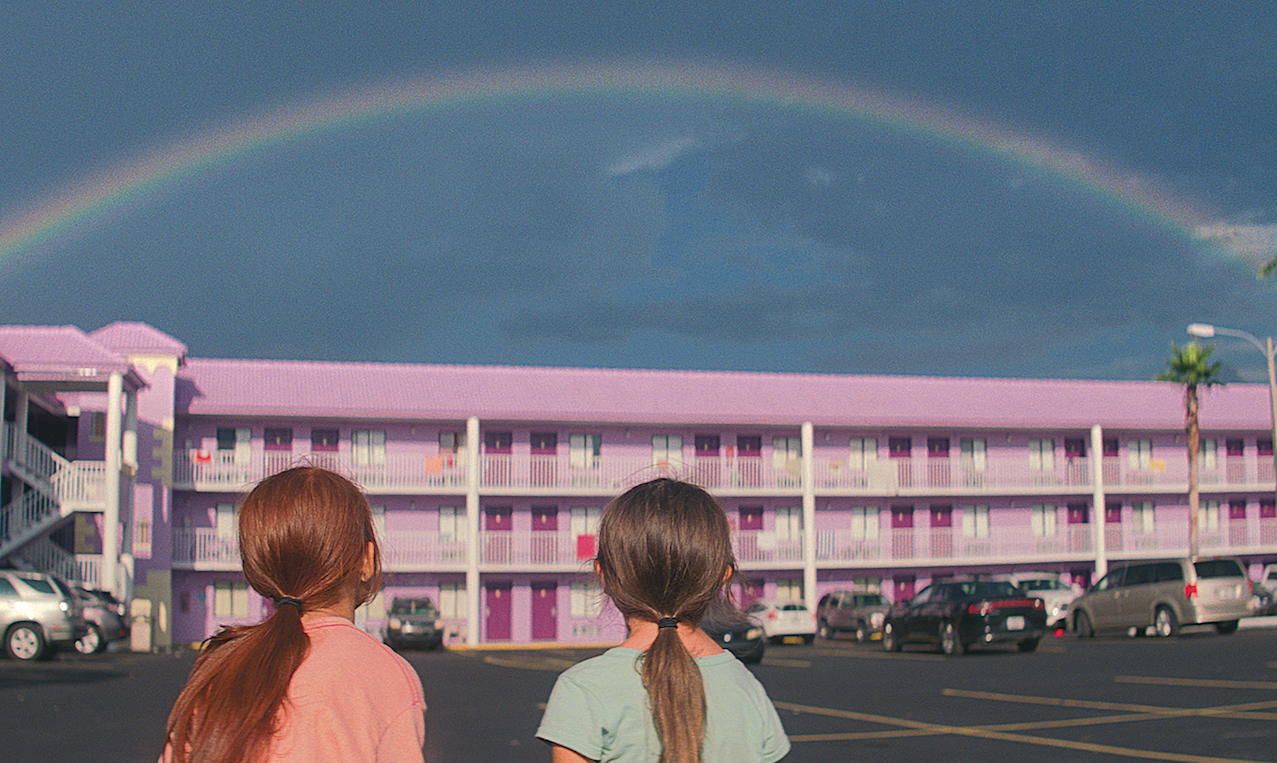More so than any other American feature released this year, The Florida Project has high spirits. 2015's breakout hit Tangerine, an iPhone-shot tale of transgender sex workers at large on the boulevards of L.A., introduced writer-director Sean Baker as a filmmaker keen to paint the screen with new shades and stripes, and intelligent enough to recognise that achieving this is more often than not a matter of casting - seeking out anyone beyond the same old faces going through the same old routines. Baker's new film revolves around six-year-old Brooklynn Prince, a movie newcomer invited to play (or simply to be) Moonee, a little princess in reduced circumstances who spends her days and nights transforming the mauve-painted, Disneyland-adjacent motel complex she inhabits with her grifting ma Halley (Bria Vinaite) into her own personal theme park. Moonee and her pals Scotty (Christopher Rivera) and Jancey (Valeria Cotto) are children who seem like real children, not movie constructs; you might even label them brats, given that their unschooled afternoons involve spitting on cars, setting fire to things, and running pell-mell into and out of rooms and scenes alike. You could watch the mites doing this for hours, but then you're also aware you don't have to clean up after 'em, or indeed look out for them.
Baker, too, has realised authentic youthful chaos is a novel hook to hang a movie on; he hails from that indie New Wave that has given us not just Tangerine but Moonlight, another Florida project that proposed one could shrug off linear plot for sustained atmosphere, and that sensed we can gain a lot from being allowed to hang with a film's characters for extended periods. Some clue as to The Florida Project's real project comes with the early shot that finds an oblivious Moonee playing with dolls while Halley, out of focus in the foreground, pleads her case before a counsellor or parole officer. As confirmed by a later scene that reprises this framing (Moonee busting dance moves while Halley rows with a motel clerk), this is a film operating on two planes simultaneously - something like last year's excellent Little Men shifted several hundred miles west. On one plane, the blessed ignorance and innocence of youth; on the other, the adult world, with its constituent stresses and strains. For most of the running time, all Baker has to do to retain the interest is set what might be going on behind closed motel doors (the pimping, trafficking and philandering) against the blithe mischief Moonee's mob are getting up to in the stairwells and carparks beyond.
This dichotomy established, The Florida Project starts to develop into a treatise on how we police the fine line between these two worlds. Sometimes, it's straightforward: motel caretaker Bobby (a terrific, never-more-lived-in Willem Dafoe) - wearily tolerant of his tenants' transgressions and indiscretions, possibly as he's long realised he's not so very far removed from them, socioeconomically speaking - chases off a shady sort who's started hanging around the picnic benches the kids have appropriated as budget monkey bars. (He'll later be seen doing the same to some stray herons, suggesting an ingrained aversion to predators of all types.) Other times, it's a little more complex: throughout the film's second half, we're invited to wonder why Halley, hardly a health-and-efficiency nut, has suddenly become insistent that her daughter take long soaks in the bathtub of an evening. Baker's structure, it turns out, is deceptively loose: he shows us what in this particular social milieu might require protection, then throws open the door that reveals exactly why it might need protecting in the first place.
For all that, The Florida Project is never grim: every last one of its frames pops with life. Switching from the portrait of Tangerine to a new landscape mode, Baker's efforts to keep up with Moonee result in a grand tour of Floridian tourist-trap architecture: gift shops fronted by looming wizards or mermaids, the ice cream stand styled after a giant sundae. Cinematographer Alexis Zabe makes the oddest sights captivating, then fascinating: a humdrum saloon car parked under a solitary streetlight becomes a refugee from a Hopper canvas or Gregory Crewdson photograph. The sly aimlessness only feeds into the vivid sense of place. We're given time to appreciate these people probably won't travel far off-site - it's why they regard passing tourists as alien lifeforms - but also that they've created their own community here, one with its own distinctively salty argot ("Night bitch, I love you!") and leftfield, non-Disneyfied ideas of entertainment: one afternoon it's watching abandoned condos burning down, the next night rubbernecking road rage. Yet all of this, somehow, seems secondary to the sight of a young girl creating a magic kingdom of her own, and at a time when the innocence of American movies appears to be disappearing forever, there is something especially joyous about watching a director coaxing out and shaping an extraordinary central performance by apparently doing no more than offering his leading lady handfuls of Skittles between set-ups. The Florida Project is a delight, and Prince the cherry on top of it: please, for the love of God, somebody take care of this kid.
The Florida Project is now playing in selected cinemas.

No comments:
Post a Comment